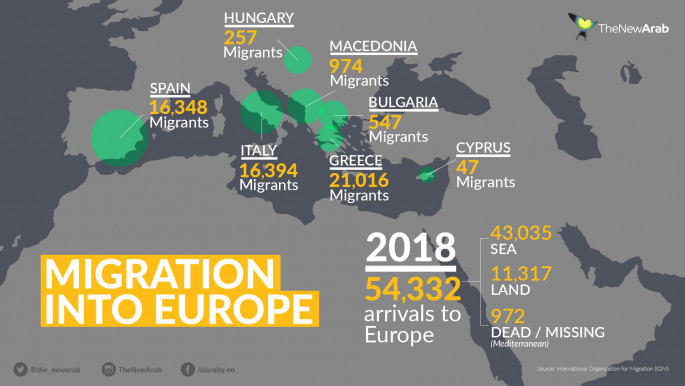Hardliners rejoice and NGOs mourn: EU agrees migrant response
An EU deal reached to help tackle the issue of migration has caused mixed reactions, with hardliners hailing the move as a "big step" and aid workers slamming the decision.
Twenty-eight European leaders met on Thursday to discuss plans to overhaul the bloc's asylum system, which has been under severe pressure since the migration crisis exploded three years ago.
The summit continued all night as countries disagreed over the way to move forward and came following pressure from Italy to scupper a joint declaration if its demands were not met.
The deal proposes setting up secure centres for migrants in the bloc, as well as "disembarkation platforms" in North Africa and sharing out refugees among member states.
Italy
Italy welcomed the decision, with hardline Interior Minister Matteo Salvini gloating that ports would be closed "all summer" to NGO ships.
"The NGOs will only see Italy on a postcard," quipped Salvini, who is also the new deputy prime minister and head of the far-right League party.
"Finally Europe has been forced to accept the argument of Italy's proposal," Salvini commented, noting that past Italian governments had been ignored by Brussels.
"Our numerous demands have been accepted. Italy is coming out of its isolation and playing a new role."
EU President Donald Tusk said that reaching the deal was the easy part, and that it was "far too early to talk about a success".
"As regards our deal on migration, it is far too early to talk about a success. We have managed to reach an agreement in the European Council, but this is in fact the easiest part of the task compared to what awaits us on the ground when we start implementing it," Tusk told reporters.
Charities, however, have slammed the accord, saying that it lets down vulnerable people and "demonising" rescuers helping migrants.
MSF
Medical charity Doctors Without Borders (MSF, Medecins sans Frontieres) had a scathing reaction, branding the pact as a woolly agreement aimed at further securing Fortress Europe.
"The only thing European states appear to have agreed on is to block people at the doorstep of Europe regardless of how vulnerable they are, or what horrors they are escaping - and to demonise non-governmental search and rescue operations," MSF's emergencies chief Karline Kleijer said.
"Without batting an eyelid, they have formalised - through financing and training - the use of the Libyan Coast Guard to intercept people and return them to Libya," she said.
"European governments do this fully in the knowledge that these people will be sent to arbitrary detention and subject to extreme abuse."
"Any deaths caused by this are now at their hands," she said.
Tusk hit back at NGO rescue boats, saying, "we have sent a clear message to all vessels, including those of NGOs, operating in the Mediterranean that they must respect the law and must not obstruct the operation of the Libyan coastguard".
France and Germany
French President Emmanuel Macron said that France will not host any migrant processing centres, and that the new secure centres would be reserved for countries on key migrant routes like Malta, Italy, Spain or Greece.
"France is not a country of first arrival. Some want to push us to that and I refused it."
The deal also called on member countries to take "all necessary" steps to stop migrants moving on to Germany, said German Chancellor Angela Merkel, who is facing opposition at home.
|
Germany has reached deals with Greece and Spain to take back migrants previously registered to those countries.
"Greece and Spain are prepared to accept asylum seekers who are in future identified by German authorities at the German-Austrian border and who have a Eurodac registration in those countries," the German government said in a statement, referring to the EU asylum fingerprint database.
East
Poland, Hungary, Slovakia and the Czech Republic, which reject any suggestion of mandatory refugee resettlement among EU members and boycotted the meeting crowed victory.
"Quotas were an issue for four years, and now everyone has dropped the topic. It was a big fight, the V4 was united and we achieved our goal. It's a big success," Czech Prime Minister Andrej Babis said, referring to the four countries.
Polish premier Mateusz Morawiecki added on Twitter: "After more than two years of difficult discussions, controversies and pressure, all the 28 EU states have unanimously adopted the position of Poland and the V4. A NO for compulsory sharing of migrants and unanimous agreement on reforming the Dublin regulation."
"When it comes to voluntary quotas, I will be very careful. Slovakia still feels that the capacity of our facilities is still available and sufficient, where we can temporarily accommodate migrants," said Slovak Prime Minister Peter Pellegrini.

Morocco, along with Tunisia and Albania, are from the countries mentioned as possible locations to host migrants at reception centres outside Europe. Morocco's foreign minister rejected on Thursday any moves by the European Union to host reception centres for migrants in his country.
"Morocco rejects and has always rejected these kinds of methods for managing the issue of migration flows," Nasser Bourita said in Rabat after meeting his Spanish counterpart Josep Borrell.
Bourita criticised such measures as "easy solutions" and "counterproductive".





 Follow the Middle East's top stories in English at The New Arab on Google News
Follow the Middle East's top stories in English at The New Arab on Google News
![Both Hamas and the Palestinian Authority welcomed the ICC arrest warrants [Getty]](/sites/default/files/styles/image_330x185/public/2024-11/GettyImages-2178351173.jpg?h=199d8c1f&itok=TV858iVg)

